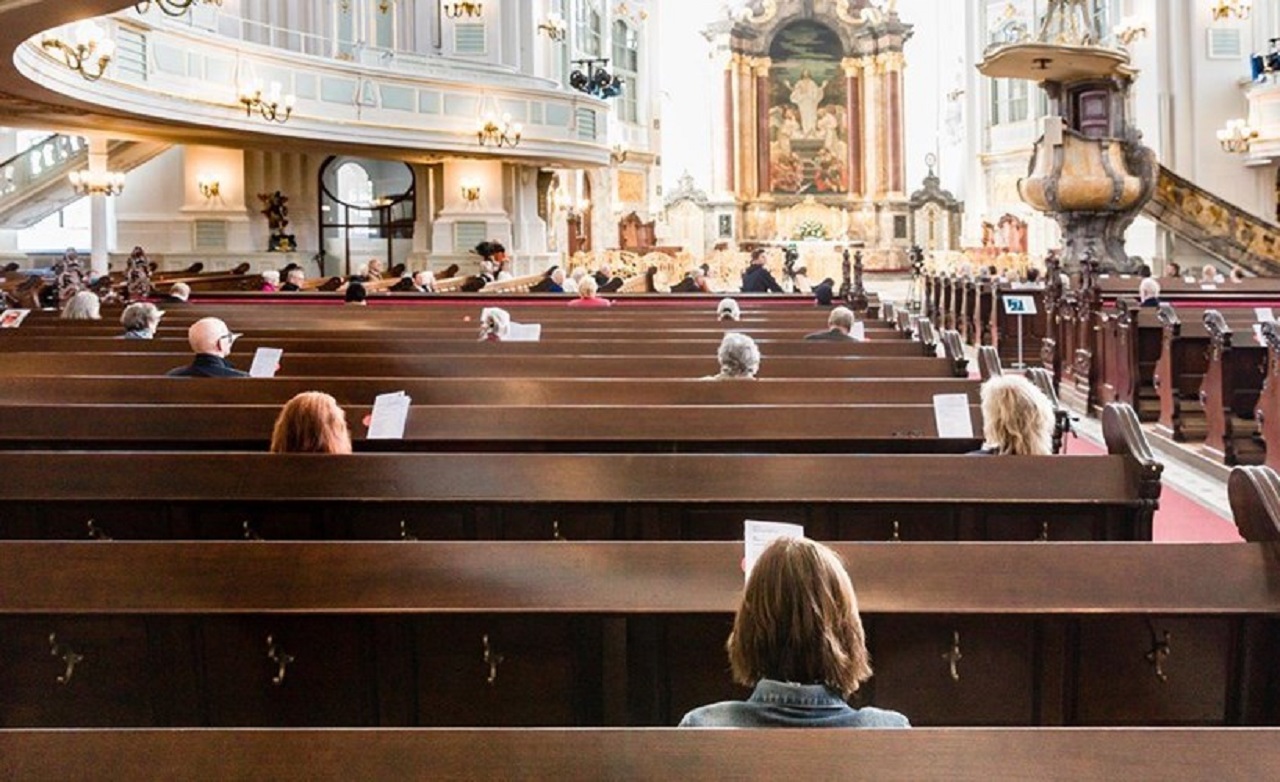
Faith-based communities, places of worship, weddings, and funerals must continue to comply with the requirements set forth on the Centers for Disease Control (CDC) guidance and the Executive Orders from their Governors, State and local Health Departments.
As churches are reconvening for public worship, some people in high-risk demographics should be encouraged to not physically attend regular worship services. The elderly and people with certain underlying medical conditions and those waiting to receive a vaccine should be careful. Churches should attend to these congregants and, if possible, make special accommodation for them: such as continuing to live-stream worship services, provide drive-in services, or provide a senior service, exclusively for those 65 and above to attend in person.
Prior to opening, all religious and faith-based organizations are required to develop for each location (indoor and outdoor if applicable) a comprehensive COVID-19 exposure control, mitigation and recovery plan. The plan must include policies regarding the following control measures: PPE utilization; on-location physical distancing; hygiene; sanitation; symptom monitoring; incident reporting; location disinfection procedures; COVID-19 safety training; exposure response procedures and a post-exposure incident project-wide recovery plan. A copy of the plan must be available at the location for inspection by state and local authorities, but state and local authorities do not preapprove the plan.
With continuing reports of COVID-19 outbreaks at spiritual gatherings, state and local authorities still strongly encourages religious leaders and communities to conduct services remotely. Alternatively, drive-in services are permitted and capacity limits do not apply. Counseling services are essential and may be permitted in-person, if remote counseling is not viable.
Best Practices
- Recommend attendant for members that are “Fully vaccinated” meaning at least two weeks have passed since a person has received the second dose of a two-dose vaccine or one dose of a single-dose vaccine.
- Inform all staff, members, and guests that they must self-screen for signs and symptoms of COVID-19 before arriving at the location and/or screen support staff for signs/symptoms of COVID-19 at the start of every shift and taking the temperature of people who is attending the services.
- Require members to use face coverings correctly and consistently.
- Require everyone to use hand sanitizer upon entering the building.
- Nurseries and youth areas should comply with the latest CDC guidelines for child care facilities.
- Regularly disinfect high traffic areas, including restroom facilities.
- Encourage members to wash hands often with soap and water for at least 20seconds (or use hand sanitizer containing at least 60% alcohol).
- Keep a safe and healthy facility in accordance with state and federal law and safety and health rules
Dr. Anthony Fauci, one of the nation’s leading public health advisers, urged more caution if only one party has received the vaccine, since people who have been vaccinated could potentially harbor virus in their nose and transmit it to others.
Operations
- Establish and maintain communication with state and local authorities to determine current mitigation levels in your community.
- Provide protections for staff and congregants at higher risk for severe illness from COVID-19.
- Consistent with applicable federal and state laws and regulations, put in place policies that protect the privacy and confidentiality of people at higher risk for severe illness regarding underlying medical conditions.
- Encourage any organizations that share or use the facilities to also follow these considerations as applicable.
- If your community provides social services in the facility as part of its mission, consult CDC’s information for schools and businesses and workplaces, as relevant, for helpful information.
- Face Coverings and Exemptions – All staff, members, and visitors in attendance shall wear face coverings before, during, and after the service (whether indoor or outdoor). The face covering requirement does apply to individual(s) leading the service and others who speak during any live service.
- Music – No choir, band, or ensemble shall perform during the service and congregation singing indoors is prohibited. Vocal or instrumental soloist musical performances are permitted with an accompanist so long as the performer wears a face covering. In the event the soloist is performing on a woodwind or brass instrument, the soloist may remove their face covering only during the performance.
Required plan guidance
- Get tested if you have signs or symptoms of COVID-19, or if you think you may have been exposed to someone with COVID-19.
- Get vaccinated when the vaccine is available to you.
- Use face coverings correctly and consistently.
- Do your best to maintain 6 feet of social distance between people.
- Provide (at no cost to support staff and ushers) and require the wearing of personal protective equipment (PPE) such as gloves, face shields, and covering masks as appropriate or required for the support activity being performed.
- Hand hygiene – Require support staff and ushers to wash their hands frequently with soap and water for at least 20 seconds (or use hand sanitizer containing at least 60% alcohol).
- Buildings and facilities – Make sure the place of congregation is well ventilated and if not, increase ventilation rates where feasible.
- Cleaning and disinfecting – Clean and disinfect high-touch surfaces after each use—including personal work stations, mirrors, chairs, headrests and armrests, doorknobs, handrails, restrooms and breakrooms using soapy water, followed by the appropriate disinfectants.
- For in-home services, religious and faith-based organizations are permitted to convene up to five individuals excluding organization staff. These individuals do not need to be from the same household. However, individuals must wear face coverings when individuals from outside of the household participate.



